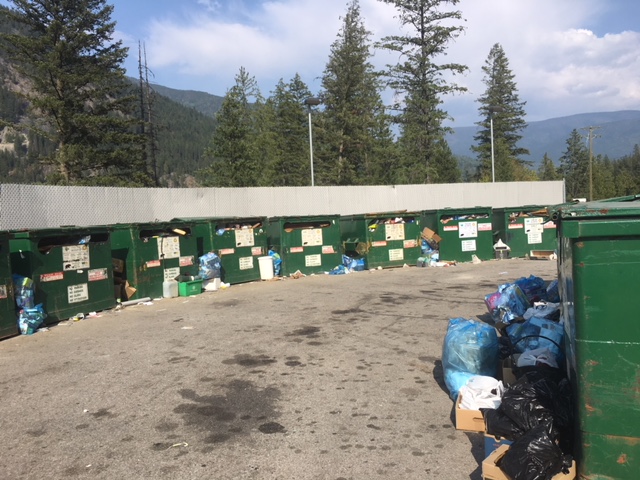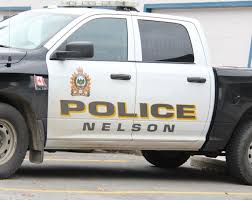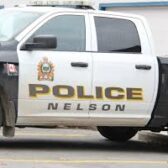Curbside composting on the radar thanks to regional district urging
The investigation into curbside compost collection in Nelson has begun, after the regional district brought forward the idea in a recent resource recovery meeting.
In mid August at a Regional District of Central Kootenay (RDCK) Joint Resource Recovery meeting the opportunity to apply for funding through the provincial Organic Infrastructure Program Fund (OIP) for a regional composting program to establish a compost processing facility was revealed.
Although the outgoing city council received the RDCK’s staff report on the proposal, a motion was made to forward the document to City of Nelson staff for further investigation and more accurate information, said Mayor Deb Kozak, the city’s representative on the regional district board of directors.
“They will be considering this and will be coming back to us with all of that information as to what that might cost as well as what some of the alternatives might be,” she said.
The RDCK report makes some pretty big assumptions without actually knowing the real consequence and circumstance in the city regarding garbage collection, said city manager Kevin Cormack, and it forms the basis of costing for the composting service.
“I do not believe our community produces garbage at a rate similar to our neighbouring communities and they assume that we do without even knowing our community,” he said.
Cormack felt the regional district should develop a study on how many people from Nelson were actually dumping garbage at the transfer station. The authors of the regional district report noted that the total tonnage of residential garbage collected at the curb in Nelson (626 tonnes in 2017) was low, as much as a third lower than
neighbouring municipalities.
“This could be attributed to the proximity to the Grohman Narrows Transfer Station for residents who prefer to self-haul their garbage between the scheduled bi-weekly collection days, coupled with a reluctance to pre-purchase disposal tags and the bags,” the RDCK staff report read.
Anecdotal evidence from transfer station staff estimates that over one third of users bringing household waste to the facility are Nelson residents, the regional district report noted.
“But that is pretty critical in a number of assumptions that they are making,” Cormack pointed out.
City council agreed and passed a motion to request a study from the regional district that breaks down figures for garbage, recycling and composting coming from the city’s residents.
The RDCK will be requesting that the city provide an approval in principle in the spring of 2019 for curb side collection by 2022 if the city wishes to participate in a regional composing program.
Making it work
The current garbage collection system within the city would be revamped in order to suit compost collecting if the project moved ahead.
Currently the city provides bi-weekly garbage collection using a manual collection system — with manual collection of recycling on the same day as garbage — by city staff utilizing a split compartment truck.
To cover part of the cost for the service the city charges residents an annual utility fee of $40, with an additional $1.50 per bag of garbage charged for disposal (to discourage garbage production).
Although there is no limit to the number of tagged bags that can be set out, residents are responsible for purchasing the bags, and for purchasing the tags which are required for each garbage bag.
The service is provided to 3,892 homes, including a number of apartments and condo residences.
— Source: City of Nelson
Regional program assumptions
Collection costs
- Implementing a redesigned curbside collection program, with new curbside containers and new materials being collected (and requiring disposal), will cost more and require a new utility fee.
- New annual fees could range from $81 (with an increased participation and set out rate similar to that of Castlegar but with no other change to the collection program), to an estimated $204 for automated collection of garbage, recycling, food and yard waste.
Carts
- For automated collection, new wheeled carts would be required.
- Estimated costs for 120 litre carts (for garbage and organics) based on recent purchases by City of Nanaimo are $50 per cart.
- Larger 240 litre capacity recycling carts could replace the existing single-use blue bag program. These carts could cost in the $60 range.
- At an estimated cost of $160 for three carts, amortized over seven years, the per household annual cart cost would be $23.
Collection truck
- The cost for a collection truck dedicated for organics was not included in the assumptions due to the number of variables as yet unknown. This could be a split body or single packer, new or used, leased or purchased, diesel or CNG, etc.
— Source: RDCK
Greenhouse gas reduction
The OIP’s objectives are to reduce greenhouse gas (GHG) emissions, expand organic processing capacity, divert new organic waste to higher end value uses, and support the nutrient recovery in the agriculture sector.
Applicants must be local governments (with encouragement to partner), projects must be in B.C., create new organics residual processing capacity, result in GHG emission reductions, and divert municipal organics from landfills and agricultural wastes from land application, among a few other criteria.
“Information provided during webinars and through communications with ministry staff suggest that the RDCK may be a strong candidate for this funding opportunity as we appear to meet all the eligibility criteria and hold many components that would positively influence the ranking of our application,” noted a regional district report.
The EOI will confirm applicants eligibly and provide insight for preparation of the application in the spring.
The OIP fund is a $30-million fund — split between approved projects — with intention to distribute around the province. Local government applicants are expected to contribute one third of project costs.
If approved, partial funding from the OIP would reduce capital investment from the RDCK reducing impact to taxation or reducing user fees for residents.
— Source: RDCK
Strength in numbers
In 2004 the regional district partnered with the Regional District of Kootenay Boundary (RDKB) to complete a feasibility study for a centralized composting facility to service the Nelson‐Castlegar‐Trailcorridor.
Although the conditions were not in place to put such a project forward at the time, the study indicated that such a facility could be feasible.
Both regional district governments remain interested in finding a facility to process organics collected from the Greater Trail area, and have been unsuccessful in finding a location within their boundaries within a reasonable hauling distance.
— Source: RDCK


























